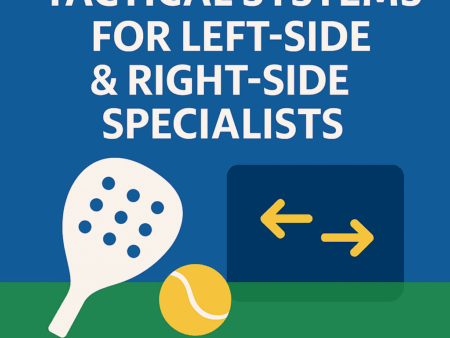Padel is fast, explosive, tactical & demanding on your whole body. You don’t need a gym membership or elite athleticism to improve — but you do need smart fitness habits. Training the right muscles, improving your mobility & building endurance will help you move better, hit cleaner shots & stay injury-free.
This guide breaks down the essential fitness areas every Padel player should train.
1. Why Fitness Matters in Padel
Padel isn’t just technique — it’s movement, balance, reaction & endurance.
Better fitness helps you:
- Move faster & with more control
- React quicker at the net
- Stay balanced during smashes & bandejas
- Play longer without fatigue
- Prevent injuries in knees, ankles & shoulders
A fit player has a huge advantage in every rally.
2. Build Explosive Footwork
Padel footwork is short, fast & multi-directional.
You need powerful small steps, not long runs.
Best footwork drills:
- Side-to-side shuffles
- Fast split-step timing
- Forward/backward transitions
- Cone or ladder drills
Train 2–3 times per week
Short sessions of 10–15 minutes are enough to see major improvement.
3. Strengthen Your Legs & Core
Legs & core are the foundation of every shot — volleys, smashes, lobs & wall defense.
Best leg exercises:
- Squats
- Lunges
- Step-ups
- Calf raises
- Lateral lunges
Best core exercises:
- Planks
- Russian twists
- Dead bugs
- Side planks
- Medicine-ball rotations
A strong lower body = better balance, power & injury prevention.
4. Improve Shoulder, Arm & Grip Strength
Overhead shots like bandejas, víboras & smashes rely heavily on shoulder stability.
Best upper-body exercises:
- Shoulder external rotations
- Light dumbbell overhead presses
- Resistance-band rows
- Push-ups
- Grip squeezes or forearm curls
These exercises build strength without overloading the joints.
5. Train Your Reaction Speed
Padel rallies at the net demand split-second reactions.
Simple reaction drills:
- Quick volley warm-ups
- Ball drop & catch
- Wall bounce drills
- Reaction apps or lights (if available)
Fast reactions = winning more points at the net.
6. Increase Your Mobility & Flexibility
Good mobility keeps your movements smooth & prevents injury.
Key mobility areas for Padel:
- Ankles (for balance & lateral movement)
- Hips (for rotation & footwork)
- Shoulders (for overheads)
- Thoracic spine (for turning & twisting)
Best mobility exercises:
- Hip circles
- Cat–cow
- Shoulder rotations
- Glute bridges
- Ankle rockers
Do mobility for 5 minutes before every match.
7. Boost Your Endurance & Stamina
Padel matches can last 60–90 minutes with constant sprints.
Best ways to build endurance:
- Interval runs (30-sec fast / 30-sec rest)
- Skipping rope
- Bike intervals
- On-court movement drills
Train endurance 2–3 times per week, 10–20 minutes each.
8. Improve Your Balance & Stability
Balance is essential for volleys, wall shots & overheads.
Try these:
- Single-leg stands
- Balance pad drills
- Single-leg mini-squats
- Slow controlled lunges
- Bosu-ball work (optional)
Better balance = fewer errors under pressure.
9. Avoid Overtraining & Injury
Padel is stressful on shoulders, ankles & elbows.
Recovery is as important as training.
Smart recovery habits:
- Stretch after every match
- Add ice or compression if sore
- Use massage guns or foam rollers
- Sleep well
- Rest 1–2 days per week
Pain is a signal — don’t ignore it.
10. Weekly Fitness Plan for Padel Players (Beginner–Intermediate)
Here’s a simple training schedule to follow:
2× per week – Strength training
Legs, core & shoulders
2× per week – Footwork + reaction drills
10–15 minutes each session
2× per week – Mobility
5–10 minutes daily if possible
1–2× per week – Endurance intervals
Short, intense sessions
Matches or practice
1–3 times per week depending on your level
This plan builds athleticism without burning you out.
🎯 Quick Summary
To train smarter for Padel:
- Train footwork for fast, explosive movement
- Strengthen legs & core for stability
- Build shoulder & grip strength for overheads
- Improve reaction speed for net play
- Work on mobility & flexibility
- Add short endurance sessions
- Recover properly to avoid injury
Smart training = better play, more wins, fewer injuries.


